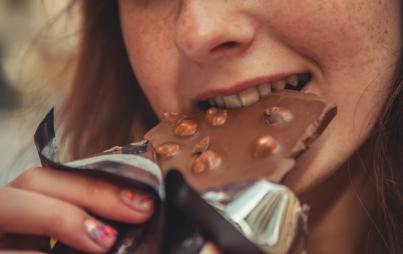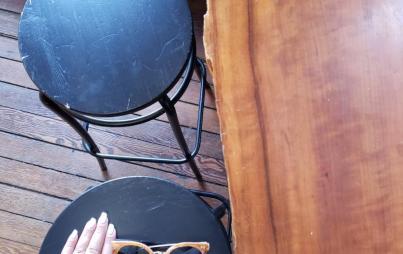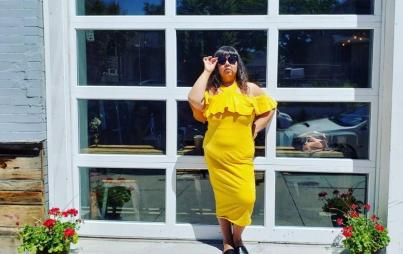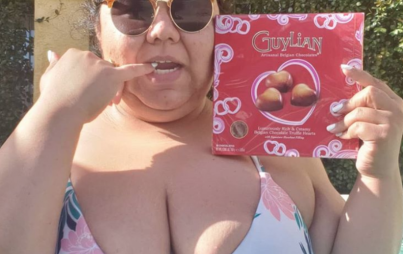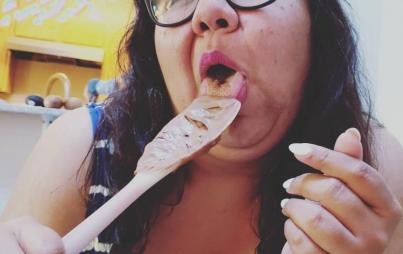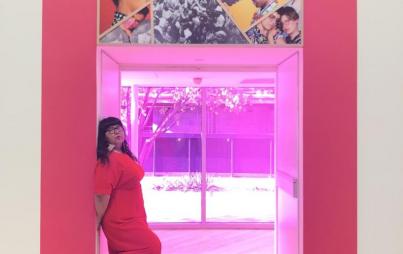
"I’ve learned how to give myself just a little tiny bit more space. I’m not living in a minute-to-minute, food-inspired soap opera in my own head, and each step away from that has given me just enough perspective to start to heal."
Having pie with ED specialist and hula hoop enthusiast Deb Burgard is one of my favorite things. We were at this place in Silicon Valley that seemed to be a local business but was actually a chain that just put the name of the city it resided within on the sign outside. I really hate that shit. Let me choose to have some basic-ass pie. Don't manipulate me into eating it.
Anyway, Deb is always dropping profound knowledge on me/the world, and on this particular occasion she was telling me about how a dieter might have a relationship to food that is characterized by “high drama” (my words, not hers).
Deb explained that many women use their relationship to food to disassociate in two key ways:
First, sometimes their refusal to eat enough or at all for prolonged periods leads to actual feelings of faintness or an impaired ability to think straight.
Second, being caught up in every single calorie, every single bite, creates a pronounced and never-ending internal drama that allows the dieter or disordered eater to maintain this micro-level engagement that creates a heightened sense of emergency. This can become a form of detachment.
As someone who identifies as an ACoA (Adult Children of Alcoholic) I really understand the impulse. I don’t drink much, and embarrassingly I don’t even know how to smoke, but I do have a tendency to use experiences the way addicts use substances, because I learned addictive behavioral frameworks growing up.
Perfect example: a few months ago I was visiting Jacob's family in Oregon. They live about an hour from Portland. So I decided to rent a car and drive there to see a friend. Day went well. Lots of fun. Went to Brunch Box. Had a hamburger between two cheeseburgers. So good. Sun sets. I head back to his family's place.
With dieting, each calorie had the power to make or break my day. With dieting, each bite I took or didn't take felt like the difference between me being good or bad.
I check the gauges when I get back to the car before I leave PDX, clocking that I have almost exactly enough gas to get home, as long as I don't stop or get lost. Ok. Someone else might have thought: "Get gas." Even some part of my brain told me to do it, but my addict brain was like, "Naw, no need for fuel."
Well, Google ends up taking me down a country road for reasons I will never understand. There are a lot of rural areas in Oregon.
And it was at one time a white protectorate state. So I'm like... nervous. The gauge is showing me I am almost certainly going to run out of gas before I get home. And now here’s the part where I let you into my brain. This is a paraphrasing of what was going on in there:
"Oh no! What do I do? Was that a confederate flag? No ,there are no fucking people out here! Is that worse or better than there being white supremacists? Where is the next gas station? What happens if I don't find one? Is my phone going to work out here? Why didn't I go to any of the literally dozens of gas stations I passed on my way out of an actual city? What is wrong with you, Virgie? You better not have to pee, girl! Do not nervous pee yourself into a fiery backroads death, a la The Hills Have Eyes!"
I mean: awful, right? And yes, it was nerve wracking, but get this: I found a small town with a gas station in it and do you know what my addict brain told me to do? KEEP DRIVING.
My therapeutically-informed self had to force my crazy self to pull over and get gas. I had to walk myself through each step, internally narrating sane behavior: pull over, turn the car off, hand the credit card to the dude who pumps gas because that's what they do in Oregon, tell him you want a full tank (no, not 1/8 of a tank).
Now compare that experience to a flashback from my dieting days:
"Oh no! What do I do? Was that a cupcake? No there are no fucking cookies out here! Is that worse or better than there being all the nutella? Where is the next dressing-free salad? What happens if I don't find one? Is my scale going to work out here? Why didn't I eat any of the literally dozens of baby carrots I passed on my way out of the house? What is wrong with you, Virgie? You better not have to eat, girl! Do not nervous eat yourself into weight gain, a la Death Becomes Her!"
I thought I was addicted to food, but I was actually addicted to dieting and the drama it ensured.
With dieting, each calorie had the power to make or break my day.
With dieting, each bite I took or didn’t take felt like the difference between me being good or bad.
With dieting, it felt like each pound I lost or gained defined my month, my worth, my life.
I’ve learned that this impulse to create emergencies and drama is drawn from a deep drive to 1) use experiences to create chemical reactions in my body, and 2) push myself to the edge so I don’t actually have to feel hard things like sadness.
So when Deb told me about this phenomenon, I understood it implicitly and totally. That was my life, too. Now that I no longer diet, I find myself pursuing other “highs,” like the gas sitch, and doing things like drinking so much coffee in the name of “kicking my day up a notch” that I give myself a stomach ache. It’s really challenging for me to just have a normal day and feel ok about it.
I know now that this impulse has manifested in dieting behavior in the past, and that I will probably always have to grapple with it, but after almost 6 years of not dieting, I have come to realize that I grew up with this pressure cooker of intergenerational family trauma, fatphobia, and a sense of stultifying dissatisfaction that I couldn’t articulate (I now know it’s patriarchy): a trifecta that made dieting almost inevitable. So, duh, of course I wanted to disassociate!
I was trying to survive. I still am.
I’ve learned how to give myself just a little tiny bit more space. I’m not living in a minute-to-minute, food-inspired soap opera in my own head, and each step away from that has given me just enough perspective to start to heal. Now every time the impulse comes, I try to get the grounded part of my brain to talk to the hurt part of my brain:
“You are safe. You can be here. Right now. Stay right here. Be still. Be still. Be still.”



